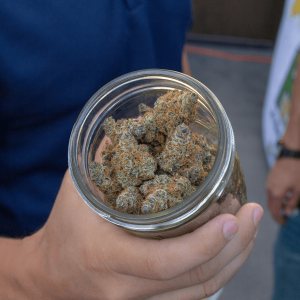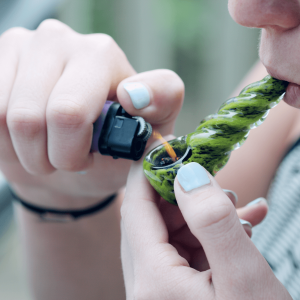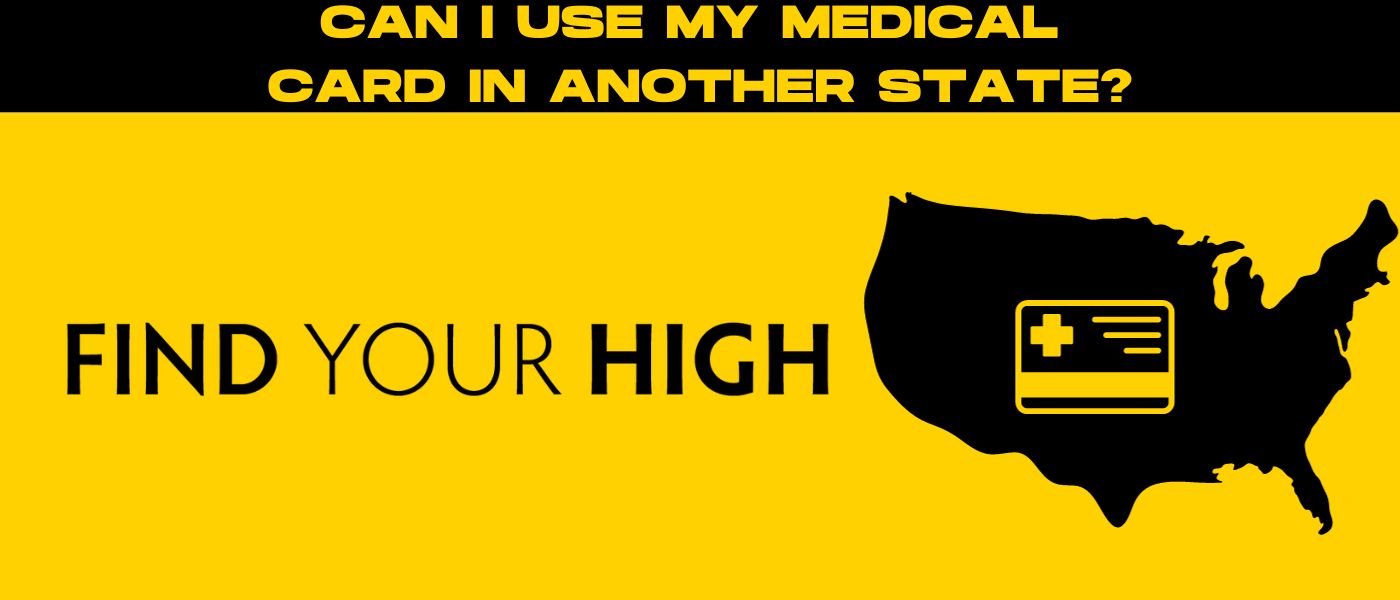While California recreational cannabis may be legal, many travelers and tourists may wonder whether or not their medical card is still needed. In fact, this topic opens to an even bigger discussion, begging the question, Can I use my medical card in another state?
Medical cards, which are usually issued to individuals in need of specific prescription medications like medical marijuana, play a crucial role in healthcare for many Americans. However, using them across state lines is not as straightforward as you might expect.
This complexity underscores the importance of understanding the rules and regulations surrounding cross-state marijuana usage before you travel. Throughout this blog, we will take a deep dive into the various state medical cannabis programs and laws, the role of medical marijuana reciprocity agreements, and the potential implications of using your medical card in another state.
We’ll also provide some handy tips and considerations to bear in mind. So, if you’re a medical card holder planning a trip to another state in the USA, you won’t want to miss all of the valuable insights we have to share. Let’s get started!
Understanding Medical Cards
Medical cards are a valuable tool in the healthcare landscape, provided to individuals who require specific prescription medications like medical marijuana.
These cards allow users to legally purchase medicinal cannabis, often at a lower cost than legalized recreational cannabis, and sometimes in increased quantities compared to recreational cannabis users. However, it’s important to keep in mind that the regulations surrounding medical cards can vary from state to state.
For example, the qualifying conditions, application process, and benefits offered by these cards can differ significantly. This variation highlights the importance for prospective or current cardholders planning to travel to familiarize themselves with the state laws and regulations.
Remember, this knowledge is crucial to ensure compliance and avoid potential legal complications.
State-Specific Regulations
The landscape of state medical cannabis and marijuana regulations is as varied as the United States itself, with each state imposing its own set of rules and restrictions. In California, for instance, patients with a medical card can grow up to six mature cannabis plants at a time, however, in Florida, medical cannabis cultivation is not allowed and patients can only purchase their doses from licensed dispensaries.
Colorado is another interesting case, where medical card holders are allowed to possess up to 2 ounces of cannabis flower, a stark contrast to Oklahoma, where patients can possess up to three ounces of cannabis flower on their person and up to 8 ounces of cannabis flower in their residence.
In some states like Arizona, a patient’s medical card is valid for 2 years, while in others like Massachusetts, the validity is only a year. These variations in rules emphasize the importance of conducting thorough research before traveling to a different state.

Medical Marijuana Reciprocity Agreements
The concept of other states medical marijuana cards and reciprocity adds another layer of complexity to this landscape. Reciprocity agreements, where one state recognizes and respects the medical marijuana laws and cards of another state, exist but are not universal. For example, Nevada and Michigan have full medical marijuana reciprocity laws, accepting medical marijuana cards from all states.
On the other hand, Hawaii operates on a limited medical marijauana reciprocity basis, only accepting out-of-state medical marijuana cards from certain states. Meanwhile, states like Texas and Idaho do not have any form of state medical marijuana patients reciprocity agreement and do not recognize out-of-state medical marijuana cards at all.
This variation in regulations underscores the importance of understanding medical marijuana reciprocity agreements and state-specific laws before planning your trip. Always remember that ignorance of the law is no excuse, and it’s your responsibility as a medical marijuana cardholder to stay informed and abide by the laws of any state you visit.
Factors Influencing Cross-State Usage
When it comes to using your medical card in another state, several factors may influence the process.
Some of the key considerations include legal aspects, types of medical conditions covered, and the provider networks and restrictions within the state.
Legal Considerations
The first and foremost factor to consider is the legal aspect of using your medical card across state lines.
You must understand that while your card may be valid in your home state, the same may not apply when you travel to another state due to differences in state laws and regulations.
Some states may have full or partial or comparable medical cannabis programs and marijuana reciprocity agreements, accepting out-of-state medical cards, while others may not recognize them at all. Also, the amount of medical marijuana you’re allowed to possess can vary significantly from one state to another.
It’s essential to familiarize yourself with these legal considerations to avoid potential legal issues.
Types of Medical Conditions Covered
Another crucial factor is the specific medical conditions for which medicinal cannabis is legal and approved in the state you’re visiting.
While conditions like chronic pain, epilepsy, and cancer are generally accepted across most states, other conditions may not be recognized everywhere.
For instance, some states may allow medical marijuana for post-traumatic stress disorder (PTSD), while others might not. Therefore, it’s essential to look into the approved conditions in the state you’re visiting if you plan on using your medical marijuana card.
Provider Networks and Restrictions
Lastly, it’s vital to consider provider networks and restrictions in the state you’re visiting.
Some states may have numerous dispensaries that accept out-of-state medical cards, while others may have very few or none at all.
Additionally, some states may impose restrictions on possession limits the quantity of medical marijuana that can be purchased at a time.
In some cases, the state may even require you to register with the state’s medical marijuana program before you can even purchase cannabis.
Understanding these factors can help ensure you have access to your medication while you’re traveling.
Can I Use My Medical Card in Another State: Challenges and Considerations
Navigating the landscape of medical marijuana laws in different states can be quite challenging, but with the right information and guidance, it becomes more manageable.
It’s important to keep in mind potential limitations when using a medical marijuana card in another state. While some states may accept your out-of-state medical marijuana card, others might not, which could limit your ability to legally purchase medical cannabis.
Even in states with reciprocity agreements, there may be restrictions on the amount of medical cannabis you can purchase, your eligibility based on your specific medical condition, or the need to register with the state’s program. Just something to be aware of!
Moreover, the risks and consequences of non-compliance are serious. If you fail to adhere to a state’s specific regulations, you could face legal repercussions, which may involve fines, imprisonment, or the potential revocation of your medical card.
In addition, you could face difficulties in obtaining a medical cannabis card in the future, even in your home state. Therefore, it’s critical to thoroughly research and comply with each state’s regulations to ensure you can use your medical card without any complications.
Stay informed and stay legal to ensure the benefits of medical cannabis can be utilized without unwanted legal impediments.

A Closer Look at Reciprocity Agreements
When it comes to medical marijuana, understanding reciprocity agreements is crucial.
These agreements allow for the acknowledgment of medical marijuana cards from one state by another. However, the specifics of these agreements can vary greatly.
Detailed Overview of States with Reciprocal Agreements
The scope and breadth of states with full medical marijuana programs and reciprocity are limited. Nevada and Michigan are prime examples of states with such agreements. These states accept and honor medical marijuana cards from all states, allowing cardholders to access their medication legally while visiting.
Certain states operate on a more limited medical marijuana reciprocity basis. For instance, Hawaii accepts medical marijuana cards from only a select number of states, which can change over time. It’s always recommended to check the current agreements before travel.
Unfortunately, a substantial number of states have yet to establish any form of medical marijuana reciprocity agreement. States such as Texas and Idaho do not recognize medical marijuana cards issued by other states. In fact, medical marijuana isn’t even legal in these states!
Consequently, patients visiting these states would not be able to legally access medical marijuana using their out-of-state cards.
Benefits and Limitations of Reciprocity
The primary benefit of reciprocity agreements is the convenience they offer to medical marijuana patients. These agreements can enable medical cannabis patients to to maintain their treatment regimen, even when they’re away from home. For patients who rely on medical marijuana for symptom management, this can be a significant advantage.
However, there are limitations and potential drawbacks to reciprocity. Firstly, not all states participate in these agreements, restricting where a licensed medical marijuana patient can legally access their medication.
Secondly, even states with full reciprocity may have different regulations regarding the amount of marijuana a patient can possess, which can differ from the allowances in their home state.
Furthermore, reciprocity doesn’t always mean patients can purchase medical cannabis in the visiting state. Some states may require patients to register with their state’s medical marijuana cards program to issue a temporary license, adding another layer of complexity to the process.
In conclusion, while reciprocity agreements offer potential benefits for medical marijuana patients, navigating the various state regulations can be challenging.
It’s essential to stay informed, comply with the laws in each state, and seek professional advice when unsure. Reciprocity agreements are a step toward greater access, but they also highlight the complexity of medical marijuana laws across the country.

Tips for Traveling with a Medical Card
Traveling with a medical marijuana card requires careful planning and a good understanding of the laws in the states you plan to visit.
Here are some helpful tips to ensure a smooth, stress-free journey:
Pre-Trip Planning
- Do Your Research: Understand the medical marijuana laws of the state you’re visiting. Check if they have reciprocity agreements and what the specific regulations for out-of-state cardholders are. This information can typically be found online on the state’s health department website.
- Understand Limits: Even if the state accepts your medical card, they may have different regulations on how much marijuana you can possess. Be sure to familiarize yourself with these restrictions to avoid legal issues.
- Check Dispensary Locations: Look up the locations of dispensaries in the area where you’ll be staying. This can help you plan your trip better and ensure you have easy access to your medication.
Communication with Healthcare Providers
- Inform Your Doctor: Let your healthcare provider know about your travel plans. They may have useful advice or recommendations.
- Get Documentation: Carry relevant medical documentation with you, especially if you’re traveling to a state with strict regulations. This might include a letter from your doctor explaining your condition and the necessity for your medication.
- Know the Local Doctors: In case of an emergency, it can be helpful to know the contact information for healthcare providers in the area you’re visiting. They can provide assistance if you run out of your medication or have a medical emergency.
Emergency Preparedness
- Carry Essentials: Always travel with enough medication to last your entire trip and a little extra in case of travel delays.
- Stay Safe: Keep your medication in its original packaging to avoid confusion, and always carry it in your carry-on bag to ensure it does not get lost with checked luggage.
- Know Your Rights: In case you’re stopped by law enforcement, it’s important to know your rights. Always carry your medical marijuana card and ID with you at all times, and be prepared to explain your condition and the legalities of your medication.
By following these tips, you can ensure a smoother journey, while still having access to your medication.
Remember, the key to traveling with a medical card is planning, communication, and preparedness.

Real-Life Experiences
Exploring the real-life stories of people using medical cards across state borders reveals a tapestry of narratives, with different situations, valuable insights, and lessons learned.
A common thread in these stories is the vital role that preparedness and research play in navigating the complex terrain of state medical marijuana laws.
One such story involves John, a resident of California and a medical marijuana cardholder, who frequently travels to Nevada for work. Armed with a good understanding of the full reciprocity agreement between these two states, John is able to continue his treatment seamlessly across state lines.
His story underscores the importance of being well-informed about the reciprocity agreements in place between your home state and any states you plan to visit.
Contrastingly, Sarah, another medical marijuana patient from Arizona, had a less smooth experience when she decided to take a vacation to Texas. Unaware that Texas does not accept out-of-state medical marijuana cards, she found herself in a difficult situation when she was unable to refill her medication legally.
This unfortunate experience serves as a stark reminder of the potential pitfalls of traveling without thoroughly understanding the medical marijuana laws in your destination state.
These real-life experiences emphasize the paramount importance of planning, research, and communication when traveling as a medical marijuana patient.
While the stories vary in their specifics, one clear takeaway is the lesson that understanding the particularities of state laws and being prepared can make all the difference in ensuring access to medication and legal protection.
It is always crucial to do your due diligence and stay informed to ensure your travels are as smooth and stress-free as possible.
Legal Implications
Traveling across state lines with a medical marijuana card presents a unique set of legal implications.
These vary greatly depending on the laws of the state in question, the individual’s home state regulations, and the nature of their interstate travels.
Legal Consequences of Using a Medical Card in Non-Compliant States
For medical marijuana patients, it’s essential to understand that using your medical card in a state that doesn’t recognize out-of-state cards can lead to severe legal consequences.
In states where medical marijuana is not legalized or where reciprocity is not recognized, possession of marijuana is often considered a criminal act or even a federal crime, regardless of its medical purpose.
Penalties can range from fines to imprisonment, depending on the specific laws of the state. It’s crucial to remember that even though you’re legally allowed to use marijuana for medical purposes in your home state, this does not automatically grant you the same privilege in other states.
Legal protection in your home state does not extend beyond its borders, and ignorance of the law is not considered a valid defense in court. Therefore, it’s critical to educate yourself about the laws of the states you’re visiting to avoid any unexpected legal issues.
Recent Changes or Updates in Interstate Medical Card Usage Laws
Legal landscapes are constantly shifting as states continue to evolve their stance on medical marijuana.
For instance, in 2020, Oklahoma passed a law allowing visitors from other states to apply for a ‘temporary’ medical marijuana patient license, valid for 30 days, provided they hold a valid out-of-state medical marijuana license.
On the other hand, in states like Illinois, while medical marijuana is legal, the state does not recognize medical cards from other states. However, Illinois has legalized the recreational use of cannabis, so out-of-state visitors who are of legal age can purchase cannabis and use marijuana legally, albeit, not in the same quantities as medical patients.
These examples underscore the importance of staying updated with the latest changes and trends in interstate medical card usage laws.
Subscribe to trusted sources for news and updates, or consult with a legal professional knowledgeable in this field to ensure that you’re always up to date with the latest legal updates.

Conclusion
In essence, traveling across state lines with a medical marijuana card and necessary medication requires careful planning, extensive research, and effective communication.
The key takeaway from the real-life experiences of individuals like John and Sarah is the vital importance of understanding the reciprocity agreements between states.
It’s essential to remember that while recreational cannabis is legal, protections for medical marijuana usage in your home state do not extend beyond its borders. In states where medical marijuana is not legalized, or reciprocity agreements are not recognized, possession of marijuana could lead to severe legal consequences, ranging from fines to imprisonment.
The legal landscape revolving around medical marijuana continues to evolve, as seen in recent changes in states like Oklahoma and Illinois. Therefore, staying up-to-date with the latest legal updates, either through trusted news sources or consultation with a legal professional, is paramount.
Planning, preparedness, and knowledge are, indeed, your best allies when traveling with a medical marijuana card.
Traveling with a medical card doesn’t have to be daunting. By staying informed and prepared, you can ensure your journey is trouble-free and seamless, allowing you to focus on what’s truly important – maintaining your health and well-being.
It’s a complex terrain to navigate, but with the right tools and information, you can confidently traverse this landscape. Remember, the journey can be just as smooth as the destination, with the right preparation and understanding.
Frequently Asked Questions
1. What states can I use my Florida medical card?
As a Florida medical marijuana cardholder, it is crucial to understand the concept of medical marijuana reciprocity states, which refers to whether one state recognizes and honors the medical marijuana program of another state. However, as of now, there are only a limited number of states that offer some form of medical cannabis reciprocity and allow Florida medical marijuana patients to use their medication legally within their jurisdiction.
A few such states include Arizona, Arkansas, Hawaii, Maine, Michigan, Nevada, New Hampshire, New Mexico, Oklahoma, Pennsylvania, and Rhode Island. However, the specifics can vary, with some states allowing Florida cardholders to possess medical marijuana but not purchase it. Other states may allow short-term access to their medical marijuana program for visiting patients or cardholders via a temporary license.
Please note that the aforementioned information changes frequently as more states loosen their restrictions on medical marijuana. It is therefore advised to check with the health department or equivalent authority of the state you plan to visit prior to your travel. Always stay up-to-date with the latest information to ensure you are in compliance with all local rules and regulations.
2. Does Connecticut accept out-of-state MMJ cards?
As of current regulations, Connecticut does not have a reciprocity program in place for out-of-state medical marijuana (MMJ) cardholders. This means that even if you hold a valid MMJ card from another state, it is not recognized in Connecticut. Possession or consumption of medical marijuana, therefore, could potentially result in legal consequences.
Please note that while Connecticut has legalized medical marijuana for its residents, this does not extend to visitors or non-residents. However, the laws surrounding medical marijuana are evolving rapidly, so it’s always a good idea to check the latest regulations from official sources or consult with a legal professional before traveling.
3. Does Florida accept out-of-state medical cards in 2023?
As of the latest legal updates, Florida does not have a reciprocity agreement that accepts out-of-state medical marijuana cards.
Even in 2023, this remains to be the case. Therefore, even if you hold a valid medical marijuana card from another state, it is not recognized in Florida. Visitors or non-residents in Florida cannot legally possess cannabis or consume medical marijuana on the basis of an out-of-state card.
However, it’s important to note that the medical marijuana program reciprocity laws are subject to rapid changes. Florida does have a comprehensive medical marijuana program in place for its residents. This could potentially indicate a future shift in policy to include a reciprocity program, but as of 2023, this has not been realized.
As always, the best approach is to consult with trusted legal resources or professionals, and stay up to date with the latest information from official sources. Always ensure you are in compliance with the local rules and regulations of the state you are visiting or residing in.
4. Can you go into a dispensary without a card in Missouri?
In the state of Missouri, the laws and regulations related to medical marijuana are explicit.
To enter a dispensary and purchase medical marijuana, you must possess a valid Missouri medical marijuana card. This card is issued by the Missouri Department of Health and Senior Services to patients who have been recommended medical marijuana by a licensed physician in the state.
Without this card, you cannot legally enter a medical dispensary or purchase medical marijuana. This regulation is strictly enforced in all Missouri medical dispensaries as they are required to comply with state laws. Non-compliance can lead to severe penalties for both the individual and the dispensary, including fines and potential revocation of the dispensary’s license.
However, one does not necessarily need a physical medical marijuana card to enter a dispensary — that depends on the specific dispensary’s policies. Some may allow you to enter and look around without making a purchase, but this varies from dispensary to dispensary. Regardless, a valid medical marijuana card is necessary for any purchase of medical marijuana in the state of Missouri.
Additionally, Missouri recently legalized recreational marijuana. With that being said, it is legal to purchase marijuana in Missouri, but differences in quantity and potency may differ between medical and recreational marijuana.
Remember, laws and regulations surrounding medical marijuana vary vastly from state to state and are subject to change. It’s essential to remain informed about the latest rules in your specific location. Always consult an official source or legal professional before making decisions related to medical marijuana usage and purchase.

 Rewards
Rewards




